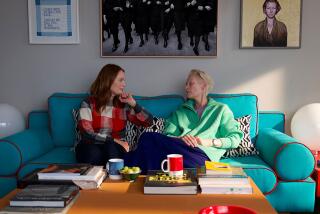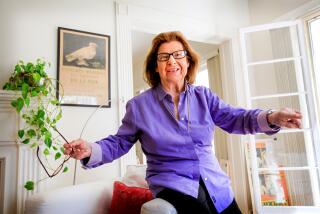Admiring Words for No Ordinary Woman
- Share via
“She is not very intelligent, but she is special,” said Petter Lindstrom, actress Ingrid Bergman’s first husband, a thing that seems shocking now, and jumps from these crowded pages; a thing that Bergman, in her graciousness renders irrelevant.
Her father, Justus, a frustrated artist, ran a camera shop in Stockholm. Her mother died in 1918 at age 33 when Ingrid was just 3 years old. From that point on, she was raised by a confusing succession of prim Lutheran aunts, rich Nazi aunts and her father’s young mistress. From a very young age, Bergman insisted on the theater, including classes at the Royal Dramatic Theater School in Stockholm, and at age 18 was cast in her first play.
Immediately, love and work began their astonishing, intricate dance through Ingrid Bergman’s life. She fell in love with the play’s leading man, Edvin Adolphson, a married man and a father, but married instead a dentist, Petter Lindstrom, eight years her senior.
In 1934 she switched to movies, against one teacher’s advice: “What a pity!” he said. “To think what a fine actress she might have been!” By her second film, reviews had reached New York. “She rates a Hollywood berth,” Variety magazine bestowed its highest praise. In 1937, a Swedish elevator operator in the office of David O. Selznick mentioned to Selznick’s office manager that she ought to check out this new talent, Ingrid Bergman. Again, no looking back; Bergman sailed for New York on the Queen Mary in 1939. “I couldn’t live there,” she said of Sweden, “even in my 20s. Sweden is too far from the rest of the world psychologically.”
*
Still, she was Swedish to her core, from her unconventional approach to romance, to her conventional willingness to let men manage her career, to her earthy forthrightness. She was not easily intimidated, a quality that provided a pillar of strength in an emotionally turbulent life.
Petter and Ingrid had a daughter, Pia Lindstrom, who emerges in Spoto’s biography as the only real victim of Ingrid’s devotion to career and her tendency to follow her heart. “She was neglected,” writes Spoto in a rare judgmental moment, “then used at home, used in letters and used in court.”
Indeed, cliche or no, Spoto unabashedly admires his subject, protecting her even from gossip about a romance with Gary Cooper and insisting on her integrity as a mother to her children by director Roberto Rossellini. He characterizes a period in her life when she had affairs with photographer Robert Capa (the affair upon which Hitchcock based “Rear Window”), composer Larry Adler and director Victor Flemming as a period in which Bergman “was beginning to have a different attitude toward lovers. . . . Capra, Adler and Fleming were guides and mentors to fresh new aspects of creative life.” He portrays her divorce from Lindstrom and her marriage to Rossellini just as history remembers it: an actress who all her life had played nuns and martyrs, proved in life, to be only human.
By 1957, that marriage had gone the way of the first; Rossellini’s affair with Indian actress Sonali Gupta created fresh scandal, while Bergman developed a close friendship with playwright Robert Anderson. Finally, in 1958, she married the Swedish producer Lars Schmidt (who, by 1970, had fallen in love with a young Parisian woman). He and Bergman remained friends.
Spoto weaves his way through this complicated, fascinating life with a grace earned over 14 Hollywood celebrity biographies. My only quibble would be that he does what Alfred Hitchcock always told his actors and actresses not to do: he lets, from time to time, his craft, the extent of his research, show. He moves us a little too quickly and neatly through this tangled life.
In 1973, Bergman was found to have breast cancer. She died in 1982. “I have had a wonderful life,” she told reporters. “I have never regretted what I did. I regret the things I didn’t do.” “She’s the greatest actress in the world,” Spoto quotes an NBC cameraman. “ ‘No,’ corrected a colleague, ‘she’s the greatest woman in the world.’ ”
More to Read
Only good movies
Get the Indie Focus newsletter, Mark Olsen's weekly guide to the world of cinema.
You may occasionally receive promotional content from the Los Angeles Times.










